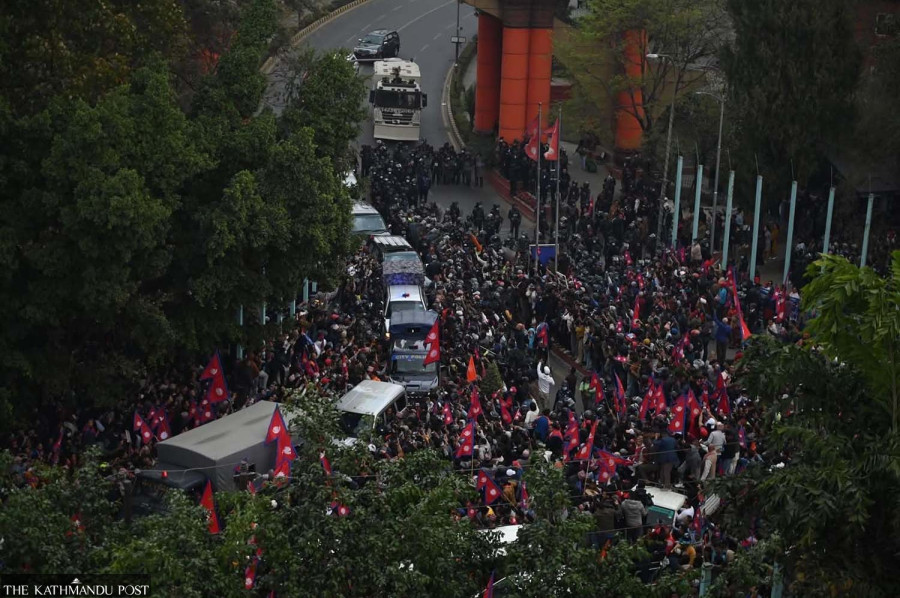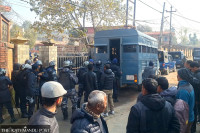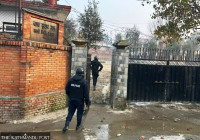Valley
Police plan traffic alternatives in view of demonstrations today
The Socialist Front is rallying to defend the federal republic while pro-monarchy forces plan protest in Kathmandu, seeking to revive Hindu state.
Purushottam Poudel
The Kathmandu Valley Traffic Office has made some arrangements for vehicular movement suggesting alternative routes in view of Friday’s twin protests.
The police authority anticipates traffic disruptions and congestion as a group of pro-republican parties and pro-monarchy forces separately stage protests on Friday.
The Socialist Front, a bloc of four opposition political parties, has announced demonstrations “to safeguard the republican system and stand against the conspiracies for [bringing back] a regressive system”. The CPN (Maoist Centre), the CPN (Unified Socialist), the Mahindra Ray Yadav-led Nepal Socialist Party and the Communist Party of Nepal led by Netra Bikram Chand comprise the front.
On the same day, pro-monarchy forces also plan a show of strength, seeking to revive the Hindu kingdom. The monarchy was abolished in 2008 through the Constituent Assembly following a people’s movement.
According to officials, the Kathmandu Valley Traffic Office is deploying nearly 1,800 personnel to handle the situation, leaving a small number of personnel for regular administrative duties.
Traffic spokesperson Dipak Giri said that some diversions might be introduced once demonstrators take to the streets.
Local authorities have allocated Bhrikutimandap for the mass gathering of Socialist Front and Koteshwar for the royalist groups.
Prime Minister KP Sharma Oli has downplayed the significance of the pro-monarchy protests, dismissing concerns over their impact.
Speaking at the inauguration of the 8th International Women Entrepreneurs Trade Fair in Lalitpur on Thursday, he said that small-scale protests and rallies frequently occur in the country and there was nothing to worry about.
“In reality, nothing significant will happen on Friday. Rallies of 10,000 to 15,000 people take place regularly in Kathmandu. There is no need to exaggerate a minor issue as a crisis,” Oli said.
Oli emphasised the importance of focusing on national development rather than trivial matters. “But this is Nepal. People are making a big fuss as if something extraordinary was going to happen on Friday. It’s only a rally in Bhrikutimandap and another at Koteshwar.”
The Socialist Front plans to bring people from various districts for the demonstration, said Pramesh Hamal, a leader of CPN (Unified Socialist).
“We are four different parties in the Front. Every party has its focus districts from where they will bring people for the protest,” Hamal told the Post. “As far as our party is concerned, we are focused on Bagmati Province.”
Hamal said the protest would be peaceful.
Dev Gurung, general secretary of the Maoist Centre, claimed that people—primarily from Bagmati Province—would participate in the rally. “However, some participants could be from outside the province as well.”
Gurung also reaffirmed that the rallies will be peaceful from the Front’s side.
Security agencies have adopted a strategy to make the demonstration peaceful.
“We are working to ensure that both sides do not clash,” a Nepal Police officer said. Nepal Police and Armed Police Force will deploy around 5,000 personnel in total to maintain order in Kathmandu.
Since the abolition of monarchy in 2008, deposed king Gyanendra Shah had been ritually releasing statements on the eve of special occasions, such as Democracy Day.
On 18 February, he released a video addressing Nepalis, reflecting on the country’s trajectory over the past seven decades and emphasising the difficulties currently faced by the people. The Democracy Day message was his first direct appeal since his ouster, urging the people to “extend their support if they want to secure the nation’s future”.
Soon after, supporters of the monarchy stepped up their activities, culminating in a show of strength on March 9 for the cause of reinstating the monarchy.
In the meantime, representatives from the Newa community have made it clear that they do not support the monarchy. Issuing a statement on Thursday, prominent representatives from various groups from the community made their stance clear on the matter.
The statement issued in support of federalism, republicanism, secularism, proportional representation, and inclusive democracy, highlighted that the autocratic monarchical system had historically oppressed Nepal’s diversity and marginalised communities in linguistic, social, cultural, as well as economic aspects.
“We, the Newa community, will never accept such activities that seek to undermine federalism, republicanism, secularism, proportional representation, and inclusive democracy, which were achieved through long struggles,” the statement read.
Holding a press meet on Thursday, leaders from the joint movement committee of the royalist groups said they give the government a week to address their concerns. The committee also says their protest will be peaceful.
The statement, signed by Nabaraj Subedi, coordinator of the joint movement committee, outlined their demands: re-establishing constitutional Hindu monarchy, abolishing federalism, and controlling corruption.
Their key demands aim to revert the major achievements of the Second People's Movement-2006.
Rastriya Prajatantra Party (RPP), the parliamentary force that has consistently championed the cause of monarchy’s revival right from 2008, has decided to hold a separate protest in the Capital on April 8.
Later on Thursday, RPP urged its party members to participate in Friday’s protest.
Some influential RPP leaders were present at the press meet organised by the Subedi-led joint movement committee. Senior RPP leaders such as Prakash Chandra Lohani, Dhawal Shemshar Rana, Rabindra Mishra, and Bikram Pandey, among others, attended the event.
At the press meet, Durga Prasai, a controversial medical college operator, was named the commander of the joint movement.
“Although our party has announced a separate protest for reviving the Hindu kingdom, we are not against the protest to be organised by the joint movement committee,” a senior leader, who asked not to be identified, said.
RPP spokesperson Mohan Shrestha said that the party has decided to extend support to the demonstrations and protests that support the party’s agenda.




 13.12°C Kathmandu
13.12°C Kathmandu











